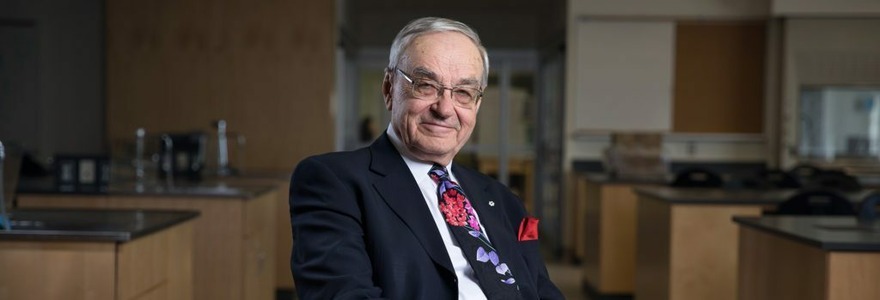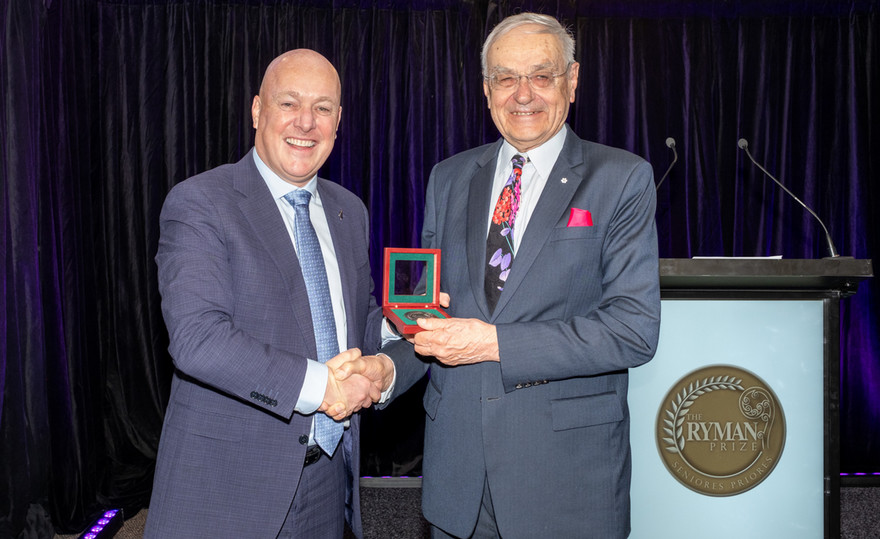Clinical neuroscientist awarded 2024 Ryman Prize for work on the "terrible three"

By Cynthia Fazio with files from Ryman Healthcare
For Dr. Vladimir Hachinski it has been an incredible journey from a small high school in Port Perry, Ont., to Logan Campbell Village in Auckland, NZ, to receive an international award for his work promoting brain health from the Prime Minister of New Zealand.
The Distinguished University Professor in Clinical Neurological Sciences and Epidemiology & Biostatistics at Schulich School of Medicine & Dentistry, has been named the recipient of the 2024 Ryman Prize, an annual $250,000 NZD grant for the world’s best discovery, development, advance or achievement that enhances quality of life for older people. He is the first Western researcher and only the fourth researcher from Canada to receive this prestigious award since it was established in 2015.
The prize will be presented by New Zealand Prime Minister Christopher Luxon at a ceremony later today, celebrating the major contributions Hachinski has made to the diagnosis, treatment, prevention, and the links between ‘the terrible three’ - stroke, dementia and coronary heart disease.
Hachinski credits his mentors, students, colleagues and patients throughout the years.
“I accept this immense honor that recognizes not only past achievements but allows highlighting future plans,” said Hachinski.
Judged by an international jury, Hachinski has been recognized for his pioneering work in dementia. He was the first to coin the term ‘multi-infarct dementia’ – after a type of dementia that is caused by a series of small strokes that damage or destroy brain tissue – and went on to develop the Hachinski ischemic scale, described by cardiologists and stroke experts around the world as the best and most widely used clinical method to distinguish between degenerative dementia and multi-infarct dementia.
“Ryman’s purpose is to enhance freedom, connection and wellbeing for people as they grow older. The award embodies that mission perfectly - in its ninth year, it’s our way of acknowledging and supporting groundbreaking work in the care of older people,” said Ryman Healthcare Group CEO Richard Umbers.
Hachinski also founded, along with John W. Norris, the world’s first successful acute stroke unit, which is now the standard of care across the globe. He was also instrumental in launching the first World Brain Day, now in its 10th year, to advance the cause of Brain Health and Disability.
Additionally, Hachinski advocates for dementia prevention by promoting the idea of ‘holistic brain health’ in which we link cerebral health with mental and social health – our ability to interact and form meaningful relationships with others.
He has published 17 books and over 700 frequently cited scientific publications. He is a member of the Orders of Ontario and Canada, was the president of the World Federation of Neurology from 2010 to 2013 and was inducted in the Canadian Medical Hall of Fame in 2018.
“Professor Hachinski’s long career in stroke, dementia and heart disease research and his ambition to educate others in the ways to prevent them make his research hugely important to combat dementia globally,” said Umbers. “Ryman is a leading provider of residential dementia care in New Zealand and our villages are places that promote holistic brain health, through active healthy socially connected lifestyles. Professor Hachinski’s work resonated with us deeply.’’
Future plans to promote brain health
Hachinski noted that two-thirds of the world's countries are currently facing a higher number of people who are aging than the number of people being born.
“The long-term solution to this problem must include solutions for brain, cerebral and mental health,” said Hachinski. “This is a formidable task, but we plan to make a start.
Currently, he is developing what he calls the ABCs of brain health: activity and sleep, balanced diet and blood pressure control, and connecting with others. The hope is to increase ease, simplicity and accessibility so everyone can take steps to address their brain health.
Initially, the plan will be to work with hospitals and family practices that have a mandate to promote health.
“Once we show that our approach works, it will be gradually extended to the whole community,” said Hachinski.
“We need better treatments for today, but prevention and brain health for tomorrow, beginning now.”









